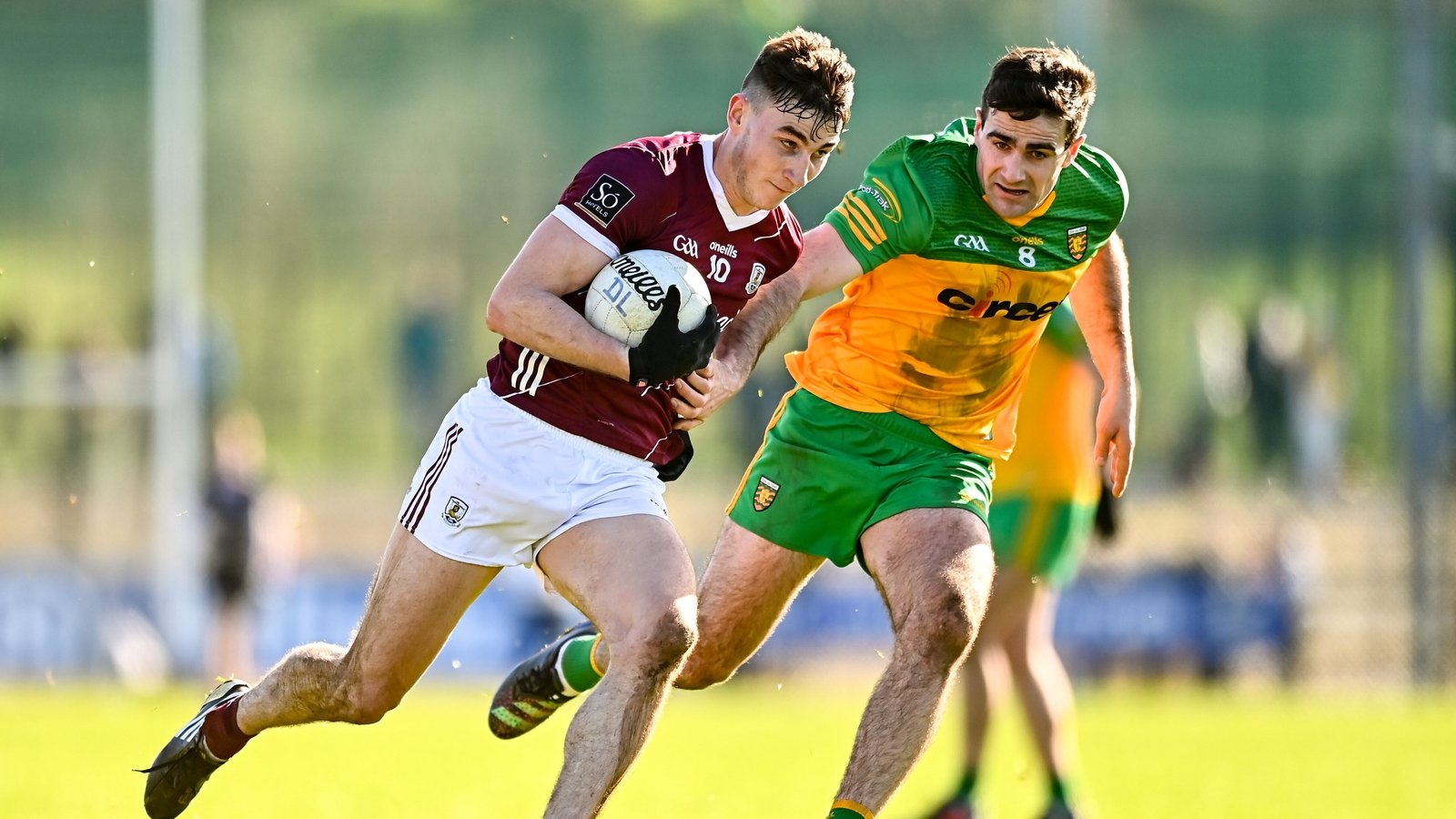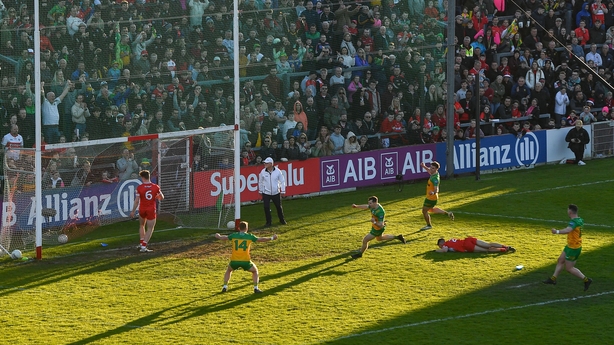Sports
Battle of old pals Joyce and McGuinness on a knife-edge

Four years after Jim McGuinness put the Galway players through their paces in a secretly filmed training session in Tuam, his Donegal team are all that stand in the way of the Westerners’ bid for a second All-Ireland final appearance in three years.
In the midst of the pandemic, the slightly grainy footage set tongues wagging that McGuinness was about to make a dramatic return to the inter-county scene with Galway, though it turned out to be a once-off.
Both parties clearly got something out of the exercise. Galway players got a bracing insight into the “intensity” with which the Donegal manager ran his training drills and McGuinness learned that high walls are an indispensable part of any inter-county operation.
McGuinness and Padráic Joyce had been old team-mates on a star-studded IT Tralee team that ran amok in the Sigerson Cup for a couple of years in the late 90s.
The pair might have clashed in the 1998 All-Ireland semi-final – a few months after their second Sigerson victory – but for Joe Brolly’s injury-time goal in a dour Ulster final.
By the time the counties did meet in the 2003 All-Ireland quarter-final, the late John O’Mahony’s great Galway side were already on the decline and a youthful Donegal team – with Brian McEniff once again back at the helm in the absence of any other takers – triumphed in a replay in Castlebar en route to an unlikely All-Ireland semi-final appearance. There was surprise all around at the outcome. Donegal full-forward John Haran told Donegal Live recently that “I think the Galway boys could be a bit cocky back then and wouldn’t be long looking down on you.”
That campaign proved a false dawn for Donegal and neither team made much dent on the championship in the late 2000s, save for Galway’s mini-rennaissance in 2008.
McGuinness, who was only anointed a Messiah after he stopped looking like Jesus, guided Donegal to the All-Ireland title in 2012 in one of the most sensational managerial coups of all time. Coincidentally, that was Joyce’s last season as a Galway player, his long inter-county career ending in the inauspicious surrounds of Casement Park in a Round 2 qualifier.
That 2020 training session was much lampooned as Galway struggled that winter, shipping a terrible hammering to Mayo in the league and then losing again, by a point, in the Connacht final.
Joyce cut a frustrated, fairly narky figure for the first couple of years in the Galway job and there were allegations of defensive naivety after Mayo’s demolition job in Tuam. The manager’s bullish and purist-tinged rhetoric was held against him.
As of summer 2024, the lay of the land has changed. Joyce has guided Galway to a third successive Connacht title for the first time since the 1980s and has now de-throned Dublin in a match which is already being portrayed as signalling the end of an epoch.
It’s quite a turn of events considering that things looked particularly unpromising for Galway at the start of the year.
The consensus over winter was that they were headed for a difficult season due to a staggering injury crisis, which reportedly left them in single digits for one training session and forced them to field a virtual second string forward line for the whole of the league.
A few cock-eyed optimists suggested it could be beneficial in building depth into the squad but this was set against the general belief that the A-listers would surely not be match-ready come championship.
The latter certainly hasn’t applied in the case of Damien Comer, who dug Galway out of an uncomfortable hole against Sligo immediately upon his return. Meanwhile, the former has come to fruition with Galway’s bench, a weakness in 2022, now emerging as a weapon in their arsenal.
Their bench out-scored Dublin 0-03 to 0-01 – an unthinkable notion in the 2010s and early 2020s – with Céin Darcy, Johnny Heaney and Tomo Culhane all landing massive scores as they overhauled the champions in the finish.
Defensive naivety is certainly no longer a trademark, with 11 clean sheets from 14 competitive games in 2024. They’ve conceded just one goal in seven championship games, that coming via a kickout malfunction when they had been coasting to victory against Armagh.
Their full-back line is comprised entirely of graduates from the 2020 All-Ireland winning Under-20 side, with Johnny McGrath and former Young Footballer of the Year Jack Glynn excelling in either corner, joined in the middle by TikTok’s own Seán Fitzgerald.
As far as injuries are concerned, Joyce might be minded to quote Michael Corleone – “just when I thought I was out…” – with players still limping out of games on a regular basis. Seán Kelly was forced off early against Dublin while Shane Walsh spent a good portion of the second half either hobbling around or on the floor receiving treatment.
Walsh’s attitude was questioned in the aftermath of a poor display against Sligo and he was dropped from the starting team for the Connacht final. Introduced shortly before half-time, he delivered a fine second half display, kicking three points late on as Galway won a dramatic provincial decider.
His display against Dublin was reminiscent of his signature performance in the 2022 All-Ireland final and a reminder of his transcendent footballing talent.
If Galway’s prospects seemed uncertain in springtime, then Donegal’s medium term outlook appeared extremely bleak this time last year.
Their 2023 season was a write-off from early on, with a successful putsch against the management of Paddy Carr, a dismal league campaign which ended in a relegation, and a loss to Down, of Division 3 fame, in the opening round in Ulster.
It was in the days after their eventual exit at the hands of Tyrone that senior Donegal players embarked on an aggressive press of Jim McGuinness’ house with the intention of securing his return to the manager’s post.
“It was constant and they never left me alone,” McGuinness recalled after the Ulster final. “Eventually Patrick McBrearty broke me.”
So far, his second coming has made a mockery of the notion that ‘you should never go back’. The speed with which their mojo has returned has been startling.
They returned to the top tier at the first attempt in the spring, going unbeaten through the campaign and pipping Armagh in the Division 2 decider.
It wasn’t until the dramatic ambush of the overall league champions Derry in Celtic Park in April that confirmation arrived that Donegal were fully back and motoring. It had the hallmarks of a McGuinness masterclass, with Donegal exploiting Derry’s dangerously high press to devastating effect, running in four goals – three of them into an empty net – on a surreal evening.

The result had an explosive effect on the championship, with Mickey Harte’s side – briefly pegged as members of a newly styled ‘big three’ – never really recovering and Donegal suddenly grouped among the contenders again.
Veteran of McGuinness’ first reign Ryan McHugh, who opted out early in 2023, was a central figure in the raid on Derry, frequently setting in train lethal counter-attacks and collecting the Man of the Match award. Feeding on breaking ball from Shaun Patton’s long kickouts, Daire Ó Baoill wound up lobbing two goals into empty nets, ruthlessly exploiting the walkabout tendencies of Derry’s fly-keeper Odhrán Lynch.
They subsequently eked out a provincial title victory on penalties over the shootout fall-guys Armagh, meaning that McGuinness had now four Ulster titles in five attempts as a manager (the 2013 provincial final loss to Monaghan being his only defeat in the province).
With experienced marquee forward Paddy McBrearty frequently held in reserve, Oisín Gallen’s development as a leading forward has continued, the full-forward landing four from play against Armagh.
The loss to Cork in Páirc Uí Rinn, where they shipped three goals, was a strange blip in their season though they’ve bounced back swiftly enough, taking their anger out against Clare and racking up 1-23 against Louth in a somewhat open quarter-final against Louth.
Galway’s usually careful and methodical attacking game has been contrasted by Donegal’s rapid counter-attacking approach, which is based heavily around the hard running of McHugh, Ó Baoill and Peadar Mogan.
Galway look to have the edge in terms of personnel, though questions still linger about their fitness. Walsh was feeling his hamstring ominously as he finally departed in the closing stages of the Dublin win but insisted in the days following he’d be right for the semi-final and is named on the team.
Both Comer and Finnerty looked somewhat inhibited against the Dubs, though both are named to start.
For Donegal, there’s one change from the quarter-final, with Jeaic Mac Ceallabhui, a regular during the league, receiving his first championship start in place of the previously injured Conor O’Donnell.
By common consensus, this semi-final is on a knife-edge, with Donegal’s free-running exuberance and the deep respect for Jim McGuinness’ managerial gambits a major factor to bear in mind.
Due to Galway’s defensive solidity and their array of attacking options, we’ll give them a tentative nod, though the game could go the distance.
And In case we get that far, neither team has missed a penalty in a championship shootout, both amassing 100% records, coincidendally, against the team that now await in the final.
We need your consent to load this rte-player contentWe use rte-player to manage extra content that can set cookies on your device and collect data about your activity. Please review their details and accept them to load the content.Manage Preferences
Listen to the RTÉ GAA Podcast at Apple Podcasts, Spotify, or wherever you get your podcasts.
Watch Donegal v Galway in the the All-Ireland Football Championship semi-final at 4pm on Sunday on RTÉ2 and RTÉ Player. Follow a live blog on rte.ie/sport and the RTÉ News app and listen to commentary on RTÉ Radio 1










